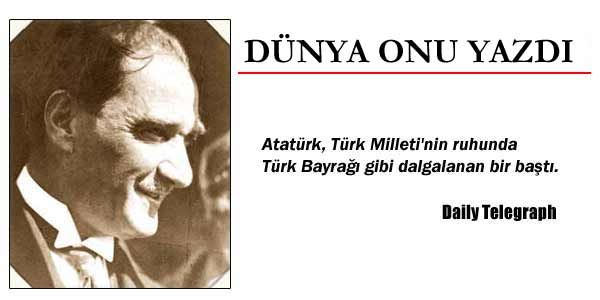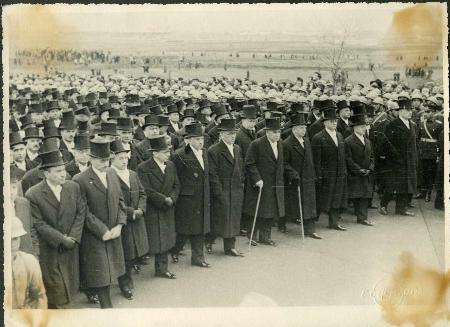Atatürk’s Personality
One of the great figures of the 20th century, Ataturk was the first president of modern Turkey. After World War I, he resisted the dividing up of his country among the victorious nations and rescued the surviving Turkish remnant of the defeated Ottoman Empire. He galvanized his people against invading Greek forces and repulsed aggression by British, French, and Italian troops. He led a Turkish nationalist campaign and founded the modern Republic of Turkey, for which he is still revered by the Turks.
Ataturk was born in 1881 in Salonika (now Thessalon’ki, Greece), then part of the Ottoman Empire, and was given the name Mustafa. His father, Ali Riza, was a minor customs officer, and his mother, Zubeyde Hanim, came from a peasant family. Ali Riza died when Mustafa was seven years old, but not before seeing to it that his son’s earliest education was carried out in a modern, secular school, rather than in a religious school. This move was to have immense historical significance for the Turkish nation. From young, Mustafa had admired the military cadets in his neighbourhood and was determined to take up a military career. Against his mother’s wishes, Mustafa entered the Military Secondary School in Salonika, where he received the nickname of Kemal, meaning “The Perfect One,” from his mathematics teacher; he was thereafter known as Mustafa Kemal.
In 1895 he entered the Military High School in Monastir (now Bitola, Macedonia) as a boarding student, and after that he entered the War College in Istanbul in 1899. Mustafa Kemal graduated as a second lieutenant in 1902 and ranked 8th in his class of 459 students. He then entered the General Staff College, graduating in 1905 as a staff captain and ranking fifth out of a class of 57. He had established himself as one of the Ottoman Empire’s leading young officers.
When World War I broke out, the Ottoman Empire entered on the side of the Central Powers. Lieutenant Colonel Mustafa Kemal was given command of the 19th Division, which was being organized in the Gallipoli Peninsula. In February 1915, the Allies attempted to take the Gallipoli Peninsula, with Istanbul as the ultimate objective. Mustafa Kemal’s success in defending Gallipoli gained him a reputation as a hero and superb military strategist, and he was hailed as the “Saviour of Istanbul”. On 1 June 1915, Mustafa Kemal was promoted to Colonel.
In 1916 Mustafa Kemal was assigned to the Russian front and promoted to general, acquiring the title of pasha. Despite having poorly equipped troops, he was the only Turkish general to win any victories over the Russians, capturing Bitlis and Mus. After the outbreak of the Russian Revolution in March 1917, which effectively took Russia out of the war, Mustafa was appointed to the command of the 7th Army in Syria. Appalled by the sad state of the army there, Mustafa Kemal resigned from his post and returned without permission to Istanbul. The government sought to put good face and placed Mustafa Kemal on sick leave for three months. In August 1918, Mustafa Kemal was assigned to command the collapsing Ottoman forces in Syria. He found the situation there worse than he had expected and withdrew to save the lives of as many of his soldiers as possible.
Fighting was halted by the Mudros Armistice (October 1918). To ensure the continuation of his rule, Sultan Mehmed VI cooperated willingly with the Allies, who assumed control of the government. The Allies did not wait for a peace treaty to begin claiming Ottoman territory, and Allied troops quickly moved in to occupy sections of Istanbul. Mustafa Kemal, with his armies having been disbanded, returned to Istanbul on 13 November 1918, just as Allied ships sailed up the Bosporus. This scene, as well as the city’s occupation by Allied troops, left a lasting impression on Mustafa Kemal. He was determined to oust them. He began meeting with selected friends to formulate a policy to save Turkey, and they developed a plan for an Anatolian national movement centred on Ankara.
Meanwhile, there was social disorder in various parts of Anatolia. Fearing anarchy, the sultan sent Mustafa Kemal to Anatolia as inspector general of the 3rd Army in May 1919. Abandoning his official reason for being in Anatolia, which was to restore order, he told the people there that he had come to save the nation from slipping through the fingers of its people. Under pressure from the Allies, the sultan dismissed Mustafa Kemal and gave orders for his arrest. Mustafa Kemal avoided dismissal from the army by resigning. As a civilian, he pressed on to Erzurum, where General Kazim Karabekir, commander of the 15th Army Corps was based. At this critical moment, when Mustafa Kemal had no military support or official status, Kazim threw in his lot with Mustafa Kemal, placing his troops at Mustafa Kemal’s disposal. This was a crucial turning point in the struggle for independence. Kazim had called for a congress of all defence-of-rights associations to be held in Erzurum on 23 July 1919. Mustafa Kemal was elected president of the Erzurum Congress and thereby gained an official status. The congress also created a provisional government, and set up a steering committee, which then elected Mustafa Kemal as head.
Mustafa Kemal publicly declared that the sultan was unable to rid the country of the Allied occupation and established the seat of his provisional government in Ankara in January 1920. In March 1920, reactionaries took over the Istanbul government and pressured the prominent Ottoman religious leaders into declaring that Mustafa Kemal and his associates were infidels who should be shot on sight. The die was cast, it would be the sultan’s government or Mustafa Kemal’s. New elections were held, and a new parliament, called the Grand National Assembly (GNA), convened in Ankara on 23 April 1920. The assembly elected Mustafa Kemal as its president.
On 10 August 1920 the sultan signed the Treaty of Sevres with the Allies. By the provisions of this treaty, the Ottoman state was greatly reduced in size, with Greece one of the major beneficiaries. Armenia was declared independent. Mustafa Kemal repudiated the treaty. With military aid from the Soviet Union, he set out to drive the Greeks from Anatolia and Thrace and to subdue the new Armenian state. As the war against the Greeks started to go well for Mustafa Kemal’s forces, France and Italy negotiated with the nationalist government in Ankara. They withdrew their troops from Anatolia. This left the Armenians in southeastern Anatolia without the protection of the French troops. With the French and Italians out of the picture, Kazim then moved against the Armenian Socialist Republic. The Armenians eventually surrendered in November 1920 and signed the Treaty of Alexandropol on 3 December. On 4 August 1921, Mustafa Kemal assumed personal direction of the war against the Greeks. He defeated the Greeks at the Battle of the Sakarya (August-September 1921) and was given the title of Ghazi. In August 1922, he initiated a surprise offensive that pushed the Greeks to the sea at Izmir and out of Anatolia.
On 1 November 1922, the GNA voted to abolish the sultanate, and this led to the flight into exile of Sultan Mehmed VI. The Allies then invited the Ankara government to discussions that resulted in the signing of the Treaty of Lausanne on 24 July 1923, ending nine terrible years of war and devastation. On 29 October 1923, the Turkish republic was proclaimed, Mustafa Kemal was elected its first president, and Ankara was named the capital. Turkey was now in complete control of its territory and sovereignty.
Mustafa Kemal then embarked upon the reform of his country, his goal being to bring it out of the Middle Ages into modern times. His instrument was the Republican People’s Party. His programme was embodied in the party’s “Six Arrows”: republicanism, nationalism, populism, statism, secularism, and revolution. The religious schools were dismantled in 1924, followed by the abolition of the religious courts. In 1925, the religious brotherhoods, strongholds of conservatism, were outlawed. The emancipation of women was encouraged by Mustafa Kemal’s marriage in 1923 to a Western-educated woman, Latife Hanim, and was set in motion by a number of laws. Almost overnight the whole system of Islamic law was discarded. From February to June 1926 the Swiss civil code, the Italian penal code, and the German commercial code were adopted wholesale. As a result, women’s emancipation was strengthened by the abolition of polygamy, marriage was made a civil contract, and divorce was recognized as a civil action.
Another important reform was the replacement of the Arabic by the Latin alphabet. Education benefited from this reform, as the youth of Turkey were encouraged to take advantage of new educational opportunities that gave access to the Western scientific and humanistic traditions. Yet another vital step was the adoption of surnames or family names, which was decreed by the GNA in 1934. The assembly gave Mustafa Kemal the name AtatYrk (“Father of the Turks”).
After having set Turkey on the path of modernization, Ataturk sought to develop his country’s foreign policy. He signed a treaty with Great Britain in June 1926, and one with Greece in December 1930.
Ataturk died on 10 November 1938, in the Dolmabahce Palace in Istanbul. His picture, name, and words are still omnipresent in Turkey. Turkish politicians, regardless of party affiliation, claim to be the inheritors of Ataturk’s mantle, but none has matched the breadth of vision, dedication, and selflessness of the Father of the Turks.


